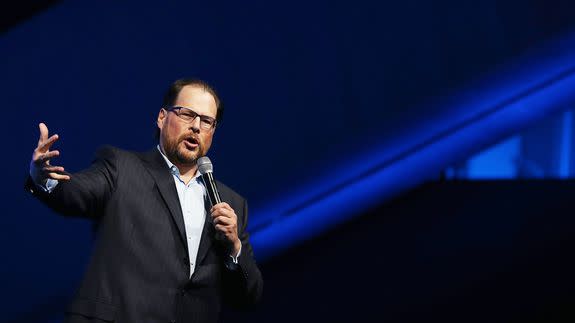Salesforce CEO on the acquisitions that got away

LAGUNA BEACH, California — Salesforce CEO Marc Benioff says he had an "exciting vision" for how he could have used Twitter at his company even though he wasn't able to make good on it.
Speaking Wednesday at the Wall Street Journal's WSJD conference, Benioff again spoke about his recent attempt to acquire Twitter — and why he backed off.
SEE ALSO: Suddenly, Twitter is left without a dance partner
Part of the problem, he said, was how the fact that news of the talks had leaked in the media, which invited extra scrutiny from the company's shareholders.
"We have looked at hundreds of companies and we have done about 40 acquisitions and we've never had a deal leak before. So we don't really understand that dynamic."
"We obviously have a very exciting vision of what we would do with Twitter and that's why we were involved in that," he said, though he declined to elaborate on what the vision was saying he didn't want to "enflame the shareholders."
"I'm running the business in partnership with my shareholders."
It was widely reported that Salesforce had been one of a handful of companies to be potentially vying for Twitter — all of which apparently fell through. Benioff's comments come amid reports that there may be renewed interest from Disney in acquiring the company.
The CEO also elaborated on his opposition to Microsoft's $26.2 billion LinkedIn acquisition, saying he was troubled by comments made by Microsoft executives about the deal.
"What they specifically said is they will create a product that will create a barrier to entry of other companies," Benioff said. "Somebody should at least look at that. "
Salesforce had also been in the running to buy the professional social network but ultimately lost out to Microsoft. Benioff has encouraged regulators to examine the deal.
"Our vision for LinkedIn was I think very different than Microsoft's. We really liked some of the business fundamentals."

 Yahoo News
Yahoo News 